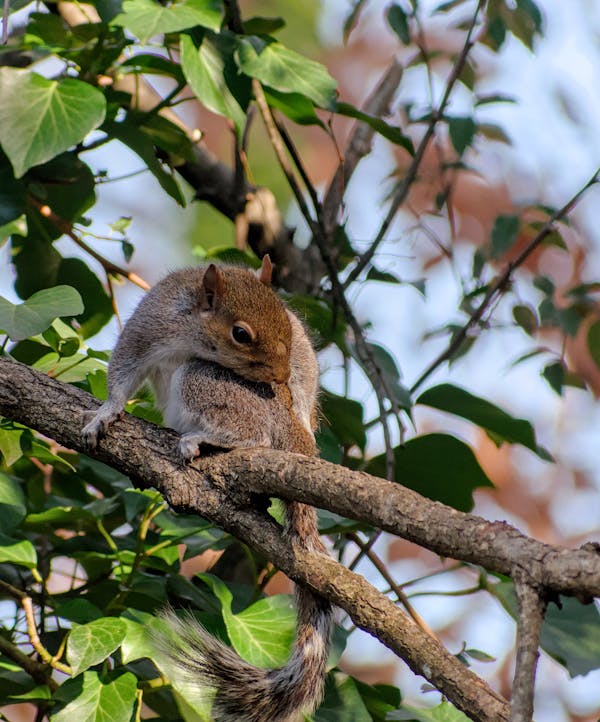Squirrel Control

Squirrel Control Methods
Gray squirrels can be a nuisance, especially when they invade attics or gardens. There are various humane methods for controlling and removing them. Here are some options:
1. Exclusion (Prevent Access)
- Seal Entry Points: Identify and seal any holes or gaps in your home, especially in the attic or roofline. Use materials like steel mesh or hardware cloth that squirrels cannot chew through.
- Close Access to Food: Remove bird feeders, seal trash bins, and avoid leaving food out for pets.
2. Trapping
- Live Traps: Set up humane live traps to catch squirrels. Place peanut butter, sunflower seeds, or corn in the trap as bait.
- Release: After trapping the squirrel, release it at least several miles away from your home to prevent it from returning. Ensure it’s in a safe area where it can find food and shelter.
3. Repellents
- Squirrel Repellents: There are various commercial repellents, such as those based on capsaicin (from hot peppers), that can be sprayed around entry points, attics, or other areas they frequent.
- Natural Repellents: Strong-smelling substances like peppermint oil, predator urine (e.g., coyote), or garlic can sometimes deter squirrels.
4. Lethal Control (In Some Cases)
- Shooting: If local laws allow, shooting squirrels in areas where it is safe and humane to do so may be an option.
- Distpatch traps .
5. Professional Help
- Pest Control Services: If the problem persists or if you’re not comfortable handling the situation yourself, a wildlife control expert can help with humane removal and prevention methods.
6. Habitat Modification
- Trim Trees: Trim branches that extend close to your house, as squirrels often use these to gain access to attics or roofs.
- Eliminate Nesting Sites: Remove any nests they’ve built in trees or attics. Squirrels are likely to return to familiar nesting sites.
In many areas, trapping and relocation of squirrels is the most effective method, though it’s essential to make sure you’re following local regulations regarding wildlife management.
Squirrel Deterrents
When it comes to deterring gray squirrels from certain areas, whether it’s a garden, attic, or bird feeder, there are several techniques and deterrents you can use. Here are some effective methods:
1. Physical Barriers
- Squirrel-Proof Fencing: Install a fence around your garden or yard that is at least 4-5 feet tall. You can also bend the top of the fence outward to prevent squirrels from climbing over.
- Bird Feeder Guards: If squirrels are raiding your bird feeders, use squirrel-proof feeders or place guards (like metal baffles) to prevent them from accessing the food.
2. Repellents
- Hot Pepper Spray: Squirrels dislike spicy food. You can make a homemade repellent by mixing cayenne pepper, chili powder, or hot pepper sauce with water and spraying it on plants or areas where squirrels are causing trouble. Be sure to reapply after rain.
- Commercial Repellents: There are many sprays available that contain natural deterrents like peppermint oil, garlic, or predator scents (such as fox or coyote urine), which can discourage squirrels from entering certain spaces.
3. Motion-Activated Devices
- Motion-Activated Sprinklers: These devices detect motion and spray water, which can startle and discourage squirrels from entering the area.
- Ultrasonic Devices: Some people use ultrasonic repellers that emit a sound only audible to squirrels and other pests, which can drive them away from the area.
4. Traps
- Live Traps: If you’re dealing with squirrels in attics or other indoor areas, live traps can be effective. After trapping them, relocate the squirrels far from your property. Be sure to check local regulations about trapping and relocating animals.
5. Eliminate Food Sources
- Remove Bird Feeders: If squirrels are constantly raiding your bird feeders, you may want to remove them for a time or switch to squirrel-resistant designs.
- Clean Up Nut or Seed Droppings: Squirrels are attracted to easy food sources. Make sure to pick up fallen nuts, seeds, or fruit from your garden regularly.
6. Planting Deterrent Plants
- Plants with Strong Scents: Some plants, such as daffodils, marigolds, and garlic, are known to deter squirrels due to their strong odors. Planting them around your garden may help keep squirrels away.
7. Habitat Modification
- Seal Entry Points: If squirrels are getting into your attic or other structures, make sure to seal all potential entry points, including holes in the roof or walls.
- Trim Trees: Squirrels can easily access roofs or bird feeders via overhanging branches. Trim any branches that come too close to structures to prevent squirrels from leaping onto them.
By using a combination of these strategies, you can effectively deter gray squirrels from invading your space.